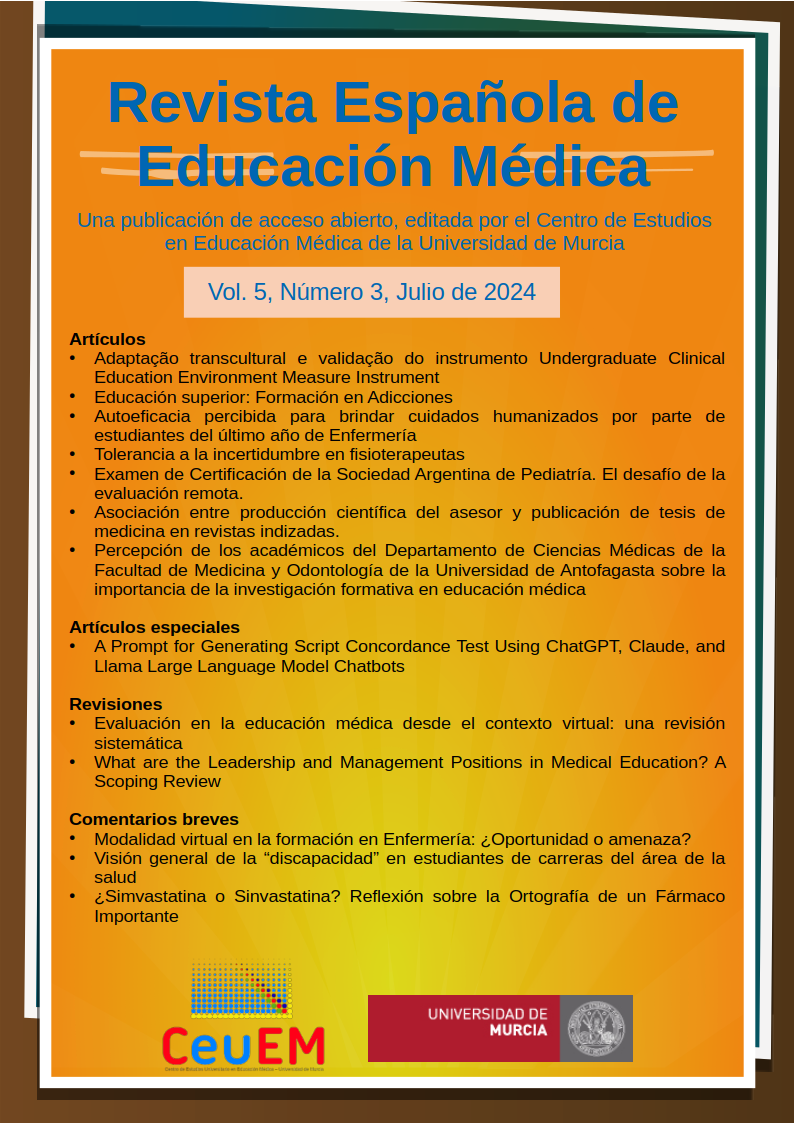Certification Exam of the Argentine Society of Pediatrics. The challenge of remote evaluation
Abstract
The SAP (Argentine Society of Pediatrics) is a certifying entity in Pediatrics and 21 Pediatric Specialties. The certification exam is voluntary, independent and free from conflict of interest. The tool used for this exam involves a development process that begins long before its execution with the preparation of the pertinent instruments and concludes with the analysis of the results and the assessment of its functioning.
Goal: To submit the process carried out by the CEP (Professional Assessment Board) for the Certification in Pediatrics and 21 Specialties and its transition to a fully remote examination.
Method: Description of the strategies implemented by the CEP to elaborate the certification exams and their transition to an online format. The process implied in the elaboration of the multiple-choice questions for the written exam and semi structured cases for the oral component as well as the implementation of an online format through Zoom platform and the safe browser (SEB)
Results: The certification exam was conducted remotely for 1586 professionals, 752 in Pediatrics and 834 in specialties, between 2020 and 2023. During this period, some negative events took place such us connection interruption and difficulties regarding the circulation speed of the multiple-choice questions. Accordingly, strategies were developed to cope with these negative events enabling the correct execution of the exam.
Conclusion: The strategy reorganization for the online format together with the updating and redefinition of the assessment instruments had a positive impact on the homogeneity and equity in the assessment criteria applied by the Assessment Board.
Key words: online format, stability, certification, medical training.
Downloads
Metrics
-
Abstract263
-
pdf (Español (España))170
-
pdf170
References
Paniagua M., Swygert K A., Downing S, M. Written Tests: Writing High Quality Constructed Response and Selected Response Items in Assessment in Health Profession Education. Yudkowsky R,Tekian A. Ed. Taylor & Francis; 2020: 109 – 124. https://www.taylorfrancis.com/chapters/edit/10.4324/9781138054394-7/written-tests-writing-high-quality-constructed-response-selected-response-items-miguel-paniagua-kimberly-swygert-steven-downing
Haladyna TM. Developing and Validating Multiple Choice Test Items. Third edition. Lawrence Eribaum Associates Inc Publishers. 2004. New Jersey. Chapter 5. Guidelines for developing MC items. Traducción Ximena Triviño. https://doi.org/10.4324/9780203825945
Galli A. Evaluación de los aprendizajes. Suplemento Especial de la Editorial Physiological Mini Reviews sobre Educación. Sociedad Argentina Investigación y Desarrollo enEducación Médica (SAIDEM). 2014; l (1). http://sedici.unlp.edu.ar/bitstream/handle/10915/126433/Documento_completo.pdf-PDFA.pdf?sequence=1&isAllowed=y
FingerP, Polloni E. Cuadernillo Técnico de Evaluación Educativa 4. Desarrollo de instrumentos de evaluación: pruebas. INEE: Instituto Nacional para la Evaluación Educativa, México .2019 disponible en https://www.inee.edu.mx/wp-content/uploads/2019/08/P2A354.pdf
Lafourcade P. Evaluación de los aprendizajes. Cince: l Madrid. España. 1987. ISBN 10: 8470460145ISBN 13: 9788470460142.
Charvat J, McGuire C, Parsons V. Características y aplicaciones de los exámenes en la enseñanza de la medicina. Cuadernos de Salud Pública N° 36. Ginebra.OMS; 1969. https://iris.who.int/handle/10665/41550
Galofré A., Wright A. Índice de calidad para evaluar preguntas de opción múltiple. Rev Educ Cienc Salud 2010; 7 (2): 141-145. https://dialnet.unirioja.es/servlet/articulo?codigo=6282642
Juul D. Oral Examination. En Assessment in Health Profession Education. Chap 8. Yudkowsky R, Tekian A. Second edition. Rachel Yudkowsky © 2020 Taylor & Francis. (E-Book); 2019.Pág 127 – 140. https://doi.org/10.4324/9781138054394
Case Based Discussion Fellowship Assessment. Assessment Public Report.CBD 2022. Australian College of Rural and Remote Medicine. https://www.acrrm.org.au/resources/assessment/public-assessment-reports
Sen Gupta T, Wong E, Doshi D and Hays R. 'Stability' of Assessment: Extending the Utility Equation [version 1]. MedEdPublish 2021, 10:155. https://doi.org/10.15694/mep.2021.000155.1
Manuel González, Ernest Marco, Toret Medina. Informe de iniciativas y herramientas de evaluación online universitaria en el contexto del Covid-19. Ministerio de Universidades. https://www.usal.es/files/Informe_modelos_evaluacion_Gabinete_ministro_universidades.pdf
Kharbat FF, Abu Daabes AS. E-proctored exams during the COVID-19 pandemic: A close understanding. Educ Inf Technol (Dordr). 2021;26(6):6589-6605. https://doi.org/10.1007/s10639-021-10458-7
Satnarine T, Lee Kin CM. A Review of Virtual Medical Student Rotations During the COVID-19 Pandemic: Their Role, Advantages, Disadvantages, and Future Prospects. Cureus. 2022;1 4(4):e24280. https://doi.org/10.7759/cureus.24280
Jaap A, Dewar A, Duncan C, Fairhurst K, Hope D, Kluth D. Effect of remote online exam delivery on student experience and performance in applied knowledge tests. BMC Med Educ. 2021 feb 2;21(1):86. https://doi.org/10.1186/s12909-021-02521-1.
Silberman, Pedro y Cols. Innovación digital para el ingreso y adjudicación a residencias en salud en argentina. Una experiencia en la era Covid Revista Argentina de Educación Médica: Vol. 10 Nº 1 Marzo, 26-32, 2021. https://raem.afacimera.org.ar/wp-content/uploads/sites/2/2021/03/Innovacion-digital-para-el-ingreso-y-adjudicacion-a-residencias-en-salud-en-argentina..pdf
Copyright (c) 2024 Servicio de Publicaciones de la Universidad de Murcia

This work is licensed under a Creative Commons Attribution-NonCommercial-NoDerivatives 4.0 International License.
The works published in this magazine are subject to the following terms:
1. The Publications Service of the University of Murcia (the publisher) preserves the economic rights (copyright) of the published works and favors and allows them to be reused under the use license indicated in point 2.
2. The works are published under a Creative Commons Attribution-NonCommercial-NoDerivative 4.0 license.
3. Self-archiving conditions. Authors are allowed and encouraged to disseminate electronically the pre-print versions (version before being evaluated and sent to the journal) and / or post-print (version evaluated and accepted for publication) of their works before publication , since it favors its circulation and earlier diffusion and with it a possible increase in its citation and reach among the academic community.



















